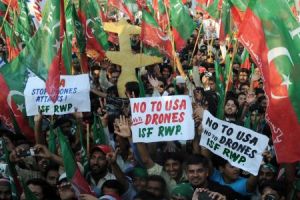Drone Protests Grow Worldwide

Public opposition to the growing use of unmanned drones is being made much more visible this week in protests taking place around the world.
The most high-profile event is taking place in Pakistan as Imran Khan leads thousands on a march against US drone strikes. Dozens of non-Pakistanis have also joined the protests in solidarity, including Clive Stafford Smith of the Human Rights group, Reprieve, and members of the US campaign group, CodePink
Protests are also taking place in Australia, the US and Europe. Ten people were arrested at a protest at the US base in Nevada from where US and UK operate armed drones over Afghanistan.
Imran Khan’s drone protest in Pakistan
Here in the UK events are taking place around the country, including a peace walk from drone manufacture UAV Engines in Shenstone to RAF Waddington in Lincolnshire; a cycle ride from Fylingdales to Menwith Hill to highlight the intelligence connection; and a protest outside the US Embassy in London. Public meetings, street stall and vigils are also taking place around the country.
Drone protest outside Shenstone UAV Engines factory
Drone protesters will no doubt be accused by some of being ignorant, naive, or just plain wrong. A prime example came in a Reuters op-ed piece by Myra MacDonald, that accused drone protesters of “doing damage”. More specifically, the piece accuses the authors of the Stamford/NYU Law school report ‘Living under Drones’ and those protesting against US drone strikes in Pakistan of ignoring the victims of the Taliban and blaming all the violence in FATA on drones.
This is nonsense, as the always excellent Kevin Gosztola (@kgosztola) points out in his thorough response to the accusations. Do read the full piece but he concludes:
Why is MacDonald writing this? Why have a number of journalists pounced on the [Living under Drones] report to make sure Americans do not take its findings too seriously? Because she like other journalists thinks the US and Pakistan can either allow drone operations—a least worst option—or it can cease drone operations and let the Taliban have more control? Because she thinks a moratorium on drones would lead to the Pakistan army wreaking more chaos and violence in the FATA region?
Why do the two have to be presented as mutually exclusive? Why can’t the US, Pakistan and other countries invest in studying Pakistan and developing non-military ties with Pakistani groups and tribes to address the threat of terrorism? Why can’t there be a focus on economic and social problems in Pakistan that fuel terrorism and also give the Pakistan government and its military the ability to wage brutal violence with impunity? And why can’t reporters like MacDonald take the anti-Americanism of people in Pakistan a bit more seriously? Why isn’t it more genuine or indisputable to them that a majority of the people in FATA oppose the US war on terrorism and want the drone strikes to stop now?
While the focus of mainstream media interest in drones remains on US drone strikes in Pakistan, the drone wars continue to spread and cause damage and death elsewhere.
Last week a US drone strike killed five “suspected” members of al-Qaeda in Yemen. The New York Times reported that Yemen’s President Hadi praised the US drone strikes during a speech in the US, claiming that US drones had a “zero margin of error”. This despite the widely reported killing of 13 Yemeni civilians in a US drone strike last month.
The Yemen Times reported that Hadi’s comments did not go down well in his own country, quoting Noor Al-Deen Al-Azazi, head of the Yemeni Center for Civil Rights, as saying “The American planes have become free to come and go in the Yemeni skies, striking many locations as if it is normal… this is a blatant violation of Yemenis’ rights.”. A clear example of this violation was the execution of Anwar al-Awlaki one year ago. An excellent new report of the killing has just been released by Cage Prisoners.
Earlier this year we reported on an airstrike in Mali that may have been carried out by a US drone. This week the Washington Post reported that US officials have been discussing the idea of deploying drones to target al-Qaeda in the Islamic Maghreb (AQIM), although WaPo stressed no decsion has yet been taken.
Meanwhile in Afghanistan, drones continue to operate with virtually no media coverage or analysis of their impact. The silence that surrounds the use of drones in Afghanistan was shown up all the more when a former British army officer broke ranks this week and described in a video interview with the BBC how he almost killed a child through a drone strike (below). James Jeffrey went on to argue that drones are fuelling warfare and make launching attacks far too easy.
Help us challenge the silence around the use of British drones in Afghanistan by signing this petition.



